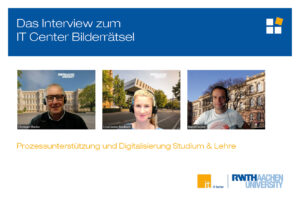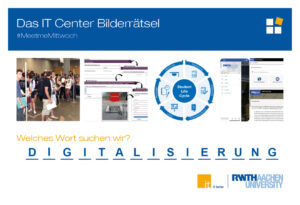#MeetMeMittwoch
Mit unserem letzten Bilderrätsel für dieses Jahr stellen wir euch noch eine weitere Abteilung des IT Centers vor. Auf unseren Social-Media-Kanälen riefen wir zum Rätselraten auf und suchten zu den vier Bildern ein bestimmtes Wort, das für die Abteilung Prozessunterstützung und Digitalisierung Studium & Lehre (PDSL) steht. Na, wer von euch kam auf das Lösungswort „Digitalisierung“? Weitere spannende Einblicke zur Abteilung PDSL erhaltet ihr im Interview.
Wer steckt hinter der Abteilung Prozessunterstützung und Digitalisierung Studium & Lehre?
Wie viele Mitarbeitende, wie viele Teams oder Gruppen sind bei PDSL?
PDSL steht für Prozessunterstützung und Digitalisierung Studium & Lehre und damit ist eigentlich schon klar, in welchem Bereich wir uns als Abteilung bewegen. Hinter der Abteilung PDSL steckt ein Team von engagierten Mitarbeitenden, Auszubildenden und studentischen Mitarbeitenden (HiWis). Die Mitarbeitenden kommen aus den verschiedensten Fachrichtungen von Informatiker*innen, UI/UX Expert*innen über Kommunikationswissenschaftler*innen bis hin zu Pädagogen und Philosophen. Die Vielfalt der Kompetenzen bringt eine gute Mischung an Perspektiven in die Arbeit ein und zeigt sich z. B. darin, dass Prozesse und Anwendungen nicht nur aus technischer Perspektive, sondern auch aus der Nutzerperspektive betrachtet und umgesetzt werden.
PDSL besteht aus drei Gruppen: der Gruppe Prozess- und Anwendungs-Beratung, Prozess- und Anwendungs-Entwicklung und Prozess- und Anwendungs-Integration. Die Abteilung umfasst insgesamt etwas mehr als 40 Personen, aktuell 36 Mitarbeitende, fünf Auszubildende und drei HiWis.
Viele Mitarbeitende nutzen die Möglichkeit der Teilzeitbeschäftigung in mehreren Fällen auch mit parallelem Studium, wodurch wir immer auch die Probleme und Bedürfnisse der Studierenden mitbekommen und bei unseren Lösungen mitberücksichtigen können. In der Abteilung werden Mathematisch-technische Softwareentwicklerinnen und -entwickler (MATSEs) ausgebildet.
Was macht die Abteilung PDSL besonders? Warum ist die Abteilung PDSL am IT Center unerlässlich?
Spontan würde ich sagen, die Vielfalt der Fachrichtungen und das Engagement insbesondere für die Studierenden gute Lösungen bereitzustellen sowie Prozesse kontinuierlich zu hinterfragen und Optimierungen zu erzielen, macht die Abteilung besonders. Gerade diese Vielfalt und die unterschiedlichen Perspektiven machen die Abteilung im doch sehr technisch orientierten IT Center unerlässlich. Dass wir sowohl die Sichtweise der Nutzenden als auch die technische Perspektive unter einem Dach vereint haben, hilft uns pragmatische aber auch nachhaltige Lösungen zu finden. Das zeichnet uns aus.
Oftmals kommt uns die Aufgabe zu, als „Übersetzer*in“ zwischen den Entwickler*innen der technischen Lösung und der alltäglichen praktischen Umsetzung durch die Nutzenden zu vermitteln. Darüber hinaus ist die Entwicklung nachhaltiger und durchgängiger Software-Lösungen für alle Beteiligten und nicht nur für kleine Gruppen ein wichtiges Anliegen. Unser Fokus liegt somit immer auf dem Gesamtprozess und wir versuchen so, Abhängigkeiten und Auswirkungen frühzeitig zu erkennen und zu berücksichtigen. Dies führt häufiger dazu, dass die oft geforderte schnelle Lösung mehr Zeit in Anspruch nimmt, was leider nicht bei allen Beteiligten immer auf Verständnis stößt. Dennoch halten wir diesen Weg für alternativlos, um Anwendungen auch langfristig betreiben zu können. Dies versuchen wir auch über den Student-Life-Cycle-Management (SLCM)-Koordinator des IT Centers, der in unserer Abteilung angesiedelt ist, in die RWTH zu vermitteln.
Welche Hauptaufgaben umfassen die Abteilung PDSL?
Wie eingangs schon erwähnt und wie auch der Name der Abteilung zum Ausdruck bringt, beschäftigen wir uns mit den Prozessen und den Digitalisierungsbestrebungen im Bereich von Studium und Lehre. Konkret ist der Schwerpunkt der Abteilung die Unterstützung der Studierenden, Fakultäten und zentralen Fachabteilungen der RWTH Aachen bei der Prozessgestaltung, Anforderungsanalyse, Entwicklung, Einführung, Integration und Weiterentwicklung effizienter sowie nachhaltiger IT-Lösungen für nutzer- und einrichtungsübergreifende Geschäftsprozesse der RWTH im Bereich von Studium und Lehre. Die Prozessunterstützung und Digitalisierung umfasst dabei den gesamten Student-Life-Cycle.
Hauptaufgaben der Abteilung sind das Management und die Weiterentwicklung der zentralen Anwendungen wie RWTHonline, RWTHmoodle, QM-System Lehre, RWTHApp und zahlreiche weitere Anwendungen im Bereich von Studium & Lehre gemeinsam mit der SLCM-Koordination, den Kooperationspartnern in der Zentralen Hochschulverwaltung (ZHV), dem Center für Lehr- und Lernservices (CLS), den Fakultäten und den Studierenden. Darüber hinaus beteiligt sich die Abteilung aktiv an Projekten und Initiativen zum (Inter-)nationalen Datenaustausch zur Verbesserung der Mobilität der Studierenden und den sich durch die Digitalisierung verändernden Lehr- und Lernformen.
Welche aktuellen Projekte und Entwicklungen stehen zurzeit an?
Neben dem Digitalisierungsschub im Bereich der Lehre durch die Pandemiephase, die uns in den letzten zwei Jahren sehr gefordert hat, sind natürlich die Betreuung und Weiterentwicklung der genannten großen Anwendungen Dauerbrenner. Bei so vielen weiteren Aufgaben fällt es schwer, die wichtigsten Projekte herauszugreifen, ohne die anderen Projekte zu vernachlässigen. Explizit würde ich aber auf drei Themen kurz eingehen:
- Lokale Eigenentwicklungen in RWTHonline: Hier sind wir in den letzten Jahren in Zusammenarbeit mit der TU Graz dabei, die Voraussetzungen und die Infrastruktur für lokale Eigenentwicklungen im Umfeld von RWTHonline zu schaffen. Erste Anwendungen sind z. B. die Generierung der Modulhandbücher oder Entwicklungen im Kontext der Projekte zur Unterstützung der Anerkennungsprozesse, Stichworte MyScore oder PIM. Die erste sichtbare Anwendung mit Userinterface ist seit August dieses Jahres im Pilotbetrieb, nämlich die digitale Abgabe von Abschlussarbeiten.
- Relaunch der RWTHApp: Für Studierende, Mitarbeitende und Besucher der RWTH bietet die RWTHApp seit vielen Jahren speziell zugeschnittene Funktionen, um den Uni-Alltag zu erleichtern. Im Laufe der Zeit ist die App gewachsen und wurde kontinuierlich um Features erweitert und optimiert. Sowohl technisch als auch in der User Experience sind inzwischen umfassende Modernisierungen notwendig. Weitere Infos zu den bereits abgeschlossenen Alpha- und Betaphasen gibt es im IT Center Blog.
- Stärkere Berücksichtigung von UI/UX-Expertise in der SW-Entwicklung: Die Anforderungen an User Interfaces einer Anwendung sind durch die mobilen Devices vielfältiger und komplexer geworden. In jeder erdenklichen Bildschirmgröße sollen sich die Nutzenden in den Funktionalitäten gut zurechtfinden und dabei eine komfortable User Experience (UX) erhalten. Daher wird es immer wichtiger, UX/UI Design früh in den Entwicklungsprozess mit einzubeziehen. Dank agiler Methoden ist dies gut möglich. Während zu Zeiten des Wasserfallmodells die UI sowie Nutzertests erst relativ spät im Entwicklungsprozess berücksichtigt wurden, wollen wir UX/UI Design heute vom ersten Sprint an mitdenken und dies im Entwicklungsprozess fest verankern.
Darüber hinaus stehen ganz praktische Veränderungen im Alltag mit den neuen Arbeitsformen wie Homeoffice, situative mobile Arbeit und die Durchführung hybrider Besprechungsmeetings. Bei der ein oder anderen Herausforderung dabei lässt sich aber für unsere Abteilung sagen, dass die neuen Möglichkeiten sehr gut angenommen werden und funktionieren und zu einer deutlichen Zufriedenheit bei den Mitarbeitenden führen, ohne dass die Effizienz und Qualität der Arbeit darunter leidet. Für uns als Abteilung also eine sehr positive Entwicklung, die sich aus der Pandemiephase ergeben hat.
Wie sieht die Zukunft der Abteilung aus?
Nach vielen sehr turbulenten Jahren während der Einführung von RWTHonline und RWTHmoodle ist mit der Zusage des Rektorates zur langfristigen Finanzierung von Personalressourcen für den SLCM-Bereich im IT Center auch für die Abteilung PDSL eine solide Grundlage geschaffen, die Herausforderungen und ständig steigenden Anforderungen im Bereich der Digitalisierung von Prozessen in Studium und Lehre zu bewältigen. Gerade ein etabliertes und harmonierendes Team, dass die komplexen Prozesse in diesem Bereich kennt und einen Einblick sowohl in die fachliche Perspektive als auch in die Perspektive der Studierenden und Lehrenden hat, ist für die Erarbeitung von guten Lösungen von hoher Bedeutung. In den nächsten Jahren werden wir die Anwendungen zur Unterstützung von Studium & Lehre weiter ausbauen. Neben den Digitalisierungsbestrebungen wie das Onlinezugangsgesetz, eGovernance NRW und der Optimierung von hochschulinternen Prozessen wird sich der Schwerpunkt voraussichtlich auf eine verstärkte Unterstützung der Mobilität der Studierenden und damit verbundenen Anforderungen an hochschulübergreifende digitale Lösungen konzentrieren.
Wir setzen dabei auf die weitere Etablierung der vom Rektorat beschlossenen SLCM-Organisationsstruktur an der RWTH und die gemeinsame Erarbeitung abgestimmter harmonisierter Prozesse. Denn nur solche Prozesse lassen sich sinnvoll digitalisieren.
Wir hoffen, euch haben die Einblicke in die Abteilung PDSL gefallen. Dann lasst uns gerne ein Herz da! 🙂
Das Jahr neigt sich zwar dem Ende zu, doch das IT Center hat noch mehr zu bieten! Freut euch schon auf das nächste Rätsel – weiter geht es im nächsten Jahr.
Verantwortlich für die Inhalte dieses Beitrags sind Christoph Becker, Bernd Decker und Lina-Louise Kaulbach.






